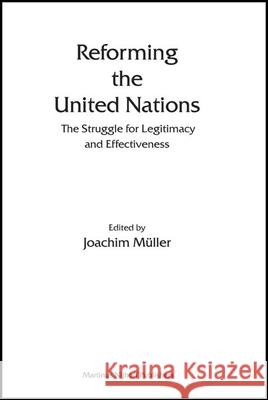Reforming the United Nations: The Struggle for Legitimacy and Effectiveness » książka
Reforming the United Nations: The Struggle for Legitimacy and Effectiveness
ISBN-13: 9789004151314 / Angielski / Twarda / 2006 / 545 str.
The United Nations is in need of reform. There has always been widespread agreement that this is the case - indeed throughout the 60-year history of the Organization. Differences over the best cure reflect the political confrontation between its 191 member states. The institution has been criticized to lack legitimacy, to need accountability and to be inefficient with a bloated bureaucracy. Recently, allegations of mismanagement and corruption in the Oil-for-Food Program have led to a crisis of confidence. The public debate followed reform initiatives for enlarging the Security Council, achieving the Millennium Development Goals, and establishing new collective mechanisms to protect human rights, counter terrorism and respond to crimes against humanity. Strengthening oversight, governance and management practices aimed at introducing fundamental institutional changes. The publication describes the reform process leading to the United Nations Summit in September 2005. The achievements remain disappointing with the failure to approve a grand bargain. A number of recommendations are put forward to facilitate the reform process in the United Nations, realising, however, that this will remain cumbersome and a lengthy step-by-step effort.











